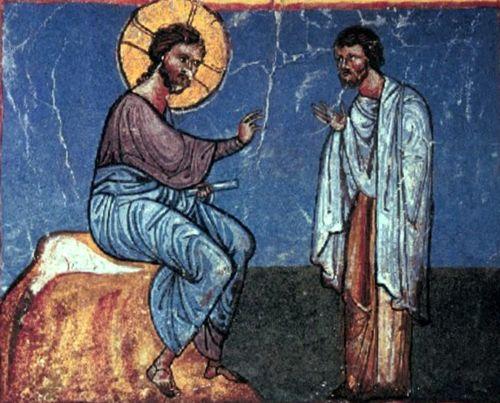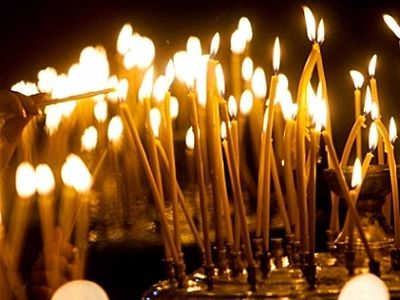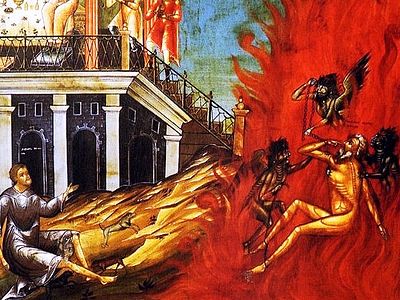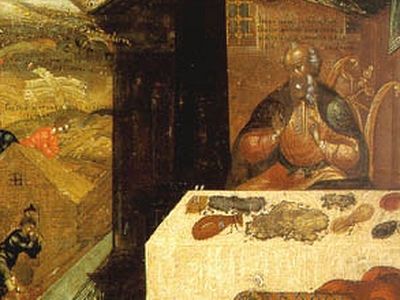
There is little that has caused such division in the Christian world than the issue of wealth. An entire school of religious thought, known as liberation theology, infected parts of the Roman Catholic church in the 1960s, and continues to this day, teaching that the wealthy are simply instruments of oppression, and that the Kingdom of God is found in seeking what they view as economic justice. Several centuries ago, some early protestant sects taught that wealth was in and if itself evil. On the other extreme, in our day and age, other protestant denominations, particularly here in the United States, teach that wealth is a gift which God will give to every true Christian who “names it and claims it”, and that every “true” Christian should be awarded earthly riches. Regardless of our theology, however, this is an issue we are always facing in our culture. The truth of the matter is that we living in this country are each wealthy beyond the wildest dreams of any Biblical king or ruler. So what are we to think, when we see such polarized viewpoints, and then read today’s rather challenging gospel?
The answer is not found in economic analysis, but in spiritual reality. It is worth reminding ourselves at the outset that there is very little that is inherently evil. Food is given to us for nourishment and enjoyment, but when it becomes an obsessive focus of life, it becomes the sin of gluttony. Sexual intimacy is a God given gift for men and women in marriage, but the misuse of sex produces sins ranging from lust to adultery to homosexuality. Drugs are a way for us to be healed of disease and infirmity, yet wrongly used they become an open door for sin of all kinds.
Understanding that kind of thought provides a way to approach the issue of wealth, and indeed, all of life. In his exchange with the rich young ruler, Jesus is not engaged in economic analysis, but instead in the diagnosis and treatment of souls.
We look at our passage to understand the lesson. A young man, described as a rich ruler, comes to Jesus. It appears that he is seeking justification, or at least some reassurance that he is on the right spiritual path. In response to Jesus’ questions, he asserts that he has followed the commandments all of his life. He has not committed adultery, nor murder. He has not stolen from others, borne false witness, nor failed to honor his parents. He has, in other words, followed the rules. He has obeyed the commandments. In the eyes of the Jews, he was most certainly a righteous man. For us, living today, his way of life would be considered praiseworthy. We are all required, at a minimum, to keep the commandments of God. What could be more simple? But the truth is that the “thou shall not”s of Scripture are only, if you will, kindergarten for Christians. If we want more, if we want to follow the road of the saints and truly become the children of God, we must not think that our spiritual life stops there.
Jesus, seeing the young man with the eyes of God, knew that, and pierced right to the heart of the matter. The issue, as Jesus observes, is not simple obedience of rules and regulations. The issue is not whether or not we can justify ourselves, to make ourselves appear to be righteous or worthy of commendation. The true issue, the key question which every Christian must face, is whether or not a person has surrendered his entire life to God, or does he or she reserve some parts wholly for himself. Put another way, does a person observe the more difficult commandments of the New Testament: that he truly love the Lord God with all of his heart, and all of his strength, and all of his soul, and that he love his neighbor as himself? Or has he compartmentalized his life, so that God is consigned to only one of a great number of boxes, pigeon-holed and kept separate from the rest of life?
Jesus knew that the focus of the young man was his wealth. It was what characterized his life. It was, in the end, the way in which he defined who he was and what he did. It was, in the end, the thing that kept him from God. He thus challenged his questioner to abandon the very thing that, whether or not the man knew it, separated him from God. To that end, Jesus asked the man to surrender that part of him which he kept separate and that he valued the most—his wealth. Keep in mind that in this instance, wealth was simply the symptom of the disease. In other circumstances, with other people, it was something else. Often it was a rigid attachment to the Law itself, or to the odds and ends of daily life. The point is that in each instance, here is something separating the person from true worship, from a genuine relationship with God.
St. Clement of Alexandria spoke to this very issue, when he wrote:
What then…made him depart from the Master, from the entreaty, the hope, the life, previously pursued with ardor? ‘Sell your possessions’. And what is this? He does not, as some conceive offhand, bid him throw away the substance he possessed and abandon his property; but bids him banish from his soul his notions about wealth, his excitement and morbid feeling about it, the anxieties, which are the thorns of existence, which choke the seed of life.
As St. Clement points out, many have disposed of their wealth to no benefit, if their underlying passions remain. And St. John Chrysostom, who himself spoke harshly of the wealthy in his own age, noted that even the poor are lost if they have within themselves the same overwhelming attraction to riches and wealth. For that matter, it is worth remembering that there were people close to Jesus who had wealth: Matthew the tax collector turned Evangelist, Nicodemus, Joseph of Arimethea. It is not the money. It is the heart of the one who holds it.
Looked at in this way, we see an immensely important principle that we can, and should apply to our own life. The question is not what do we have in the bank. The question instead is this: how do we define ourselves? How do we see ourselves, and more importantly, how do we appear to God?
For many of us, this is a genuine challenge. It is not uncommon to reserve some aspect of our lives as being outside of our faith. That preserve, that part of our life that is separate from God, can be anything. For some of us, it may be our desire for wealth, or what we do for a living. For others, it may be a seemingly unimportant hobby or passion. It may be the music we like, the clothes we wear, or the television and movies we like to watch. Whatever it may be, we know—if we are honest with ourselves—that this is an area that we like to keep for ourselves. We may even say, as the young man in today’s gospel did, that it doesn’t matter because we are at least obeying the ten commandments, and that we are, on the surface anyway, leading a moral life.
There are two problems with that sort of thinking. The first is that any area we segregate from Christ is an open door for sin to enter our life, because any such part of our life is almost certainly rooted in some passion, some deeply held personal desire. St. Theodoros the Great Ascetic plainly describes how being drawn away from the protecting grace of God occurs in but a moment.
He who gives himself to desires and sensual pleasures and lives according to the world’s way will quickly be caught in the nets of sin. And sin, when once committed, is like fire put to straw, a stone rolling downhill, or a torrent eating away its banks. Such pleasures then bring complete perdition to him who embraces them.
In other words, whether we simply allow ourselves a seemingly harmless pleasure, or give in to a larger passion such as greed or lust, it can cause a cascade of sin and error, leaving us in dire straits, and sorely afflicted.
But there is another reason as well. If we allow ourselves to focus on that deeply held passion or desire, it causes us to miss entirely what God may be saying to us. From experience, we know that our worldly interests create, if you will, a background noise for our lives. We think to ourselves that if we are straying where we ought not, that our conscience will warn us, and that God will call us back. But the background noise of our lives will often drown out that warning, if we are not constantly attentive to the leading of the Lord. In the Old Testament Book of First Kings, there is a passage describing an experience of the prophet Elijah as he awaits the Lord:
And behold, the Lord passed by, and a great and strong wind rent the mountains, and broke in pieces the rocks before the Lord, but the Lord was not in the wind, and after the wind an earthquake, but the Lord was not in the earthquake, and after the earthquake a fire, but the Lord was not in the fire; and after the fire, a still, small voice.
The still small voice is the Lord. In our gospel today, Jesus knew that even though the rich young ruler kept the rules, and observed the law, that his desire for wealth, his defining characteristic, was also the background noise that would keep him from hearing the still small voice. It was what would keep him from truly entering the Kingdom of God, because if he could not hear that whispering voice, he would never find the gate.
This is the challenge for us. We may not be rich young rulers, and we may think this gospel does not apply to us. We may lead moral lives, not breaking any of the rules, and we may think that this gospel does not apply to us. But if we are honest with ourselves, we will see something, somewhere inside of us, that we cling to tenaciously, an area of our life which we stubbornly refuse to yield to God. Whatever it may be, we find ourselves faced with the dilemma of the young man—can we surrender that which we hold dear, that we clutch to ourselves and call precious—can we abandon that, for the love of Christ?



